All attributes of a bonus plan should align to produce the results the architecture or engineering (A/E) firm needs to achieve success. If not, the bonus plan won’t be an effective tool for either the owners or the employees.
New PSMJ research finds, however, that many A/E firms still struggle to find effective incentive compensation programs.
 According to PSMJ’s 2019 A/E Bonus & Benefits Plans Benchmark Survey Report, only 34 percent of architecture and/or engineering firms responding to the survey, said that they were satisfied with how well their bonus program rewarded desired behaviors and performance. Only 24 percent said that they were very satisfied, while (18 percent) said that “it’s ok.”
According to PSMJ’s 2019 A/E Bonus & Benefits Plans Benchmark Survey Report, only 34 percent of architecture and/or engineering firms responding to the survey, said that they were satisfied with how well their bonus program rewarded desired behaviors and performance. Only 24 percent said that they were very satisfied, while (18 percent) said that “it’s ok.”
As the fundamental objective of a bonus program is to change behaviors and align them to achievement of well-defined goals, this is not a positive sign for the A/E industry.
In fact, this represents a drop in firm's overall satisfaction in their bonus programs from two years ago when 48 percent of survey respondents were satisfied that their bonus program was doing enough to motivate and inspire their staff. One silver lining is that this year shows a slight improvement from two years ago when only 22 percent of survey respondents were very satisfied with their bonus program overall.
“Unfortunately, for too many A/E firms, there is much work to be done on building transparent incentive compensation programs that have a clear cause/effect correlation,” comments PSMJ Director David Burstein, P.E For starters, many firms are paying bonuses annually and that is far too infrequent for employees to draw a clear correlation between performance and payment. In fact, some of the most successful A/E firms include small (but frequent) spot bonuses as a part of their programs.
"For many firms, when annual bonuses are actually paid out, the recipient sees bonus calculations as a ‘black box’ where he/she isn’t exactly sure what to do throughout the year to have an impact on that bonus amount,” Burstein adds.
PSMJ recommends establishing a clear framework of the type of behavior and performance that drives incentive compensation, sharing key performance indicators so that everyone can see how their behavior is impacting firm performance, and paying bonuses frequently enough to reinforce the connection between behavior and bonus.
 Now in its 10th biennial edition, A/E Bonus & Benefits Plans Benchmark Survey Report provides data on the various types of incentive bonus plans and other employee benefits provided by firms in the A/E industry. In addition, the report analyzes the level of satisfaction with various types of bonus and benefit plans. We report the results by firm size, type of service, geographic location, type of client, and client marketplace. To benchmark your A/E firm’s bonus program, employee benefits, and much more, get your copy here.
Now in its 10th biennial edition, A/E Bonus & Benefits Plans Benchmark Survey Report provides data on the various types of incentive bonus plans and other employee benefits provided by firms in the A/E industry. In addition, the report analyzes the level of satisfaction with various types of bonus and benefit plans. We report the results by firm size, type of service, geographic location, type of client, and client marketplace. To benchmark your A/E firm’s bonus program, employee benefits, and much more, get your copy here.
You also might be interested in these related posts:
Data Dive: How Financial Performance Impacts Your Compensation OptionsProject-Based Businesses and Incentive CompensationThe War for Talent: Does Your Compensation Strategy Measure Up?Trend Line: Larger Firm Equals Larger Compensation



